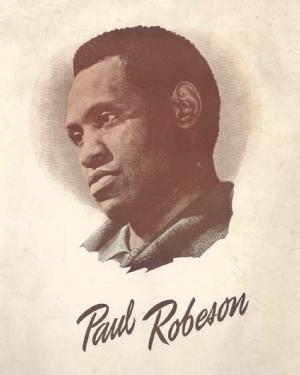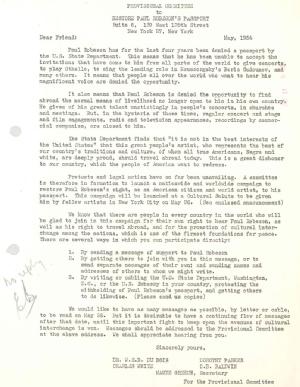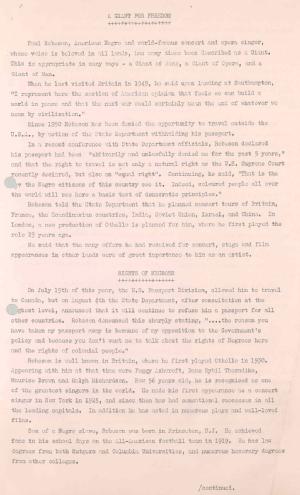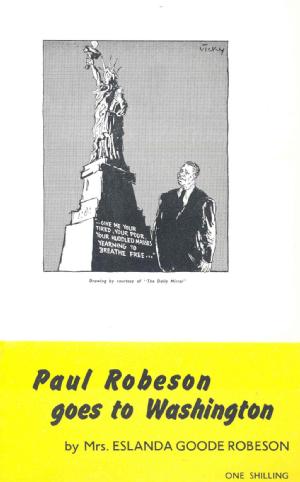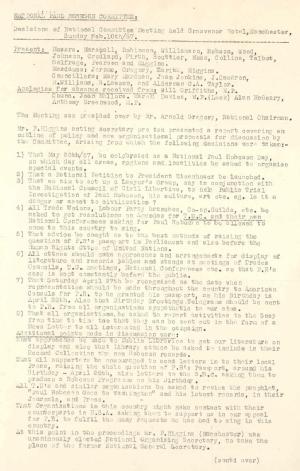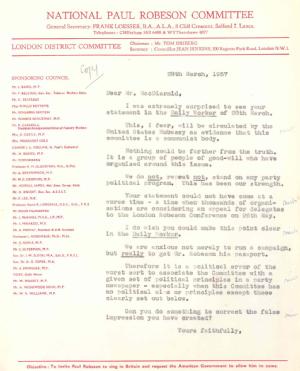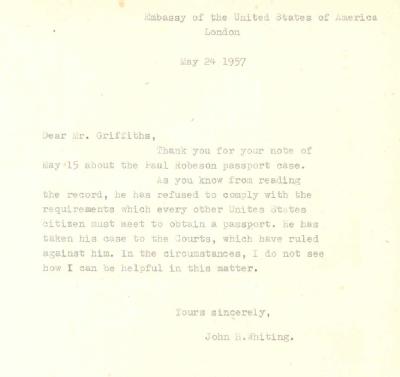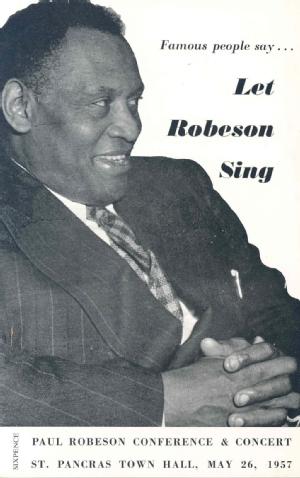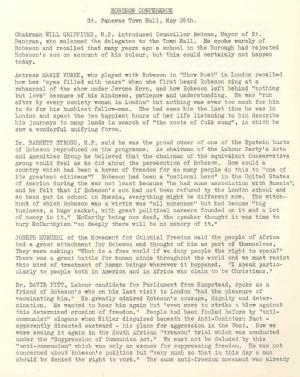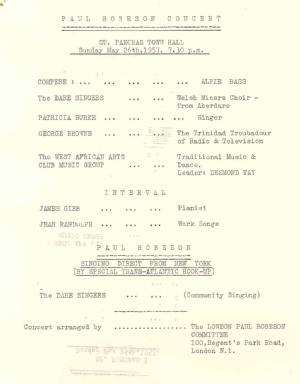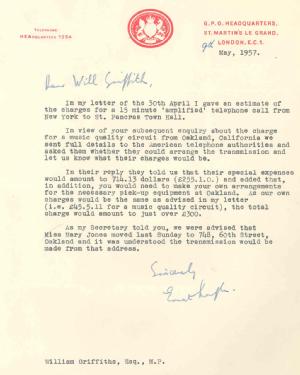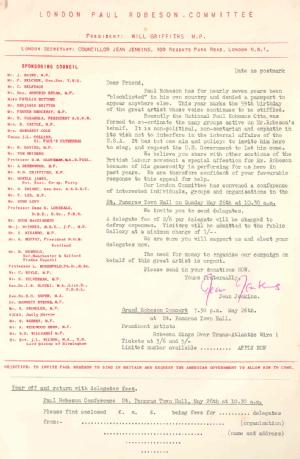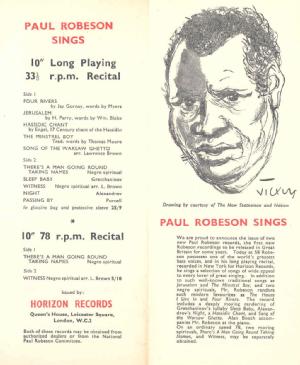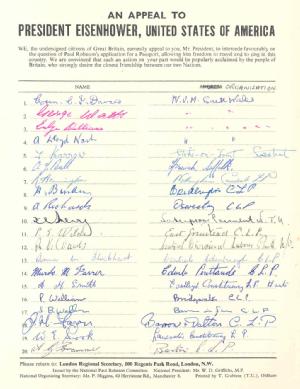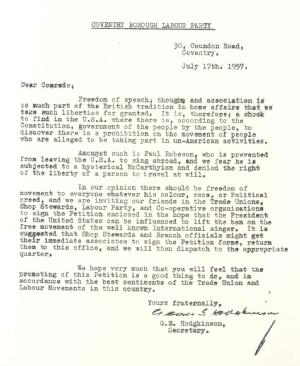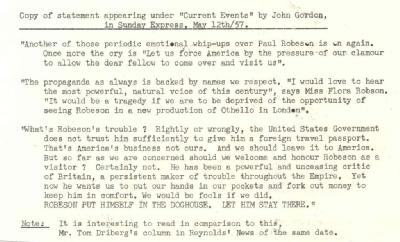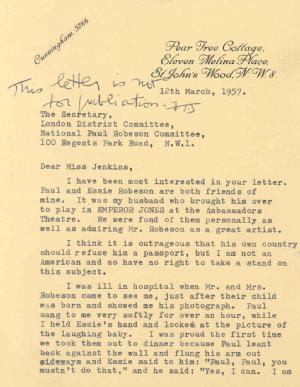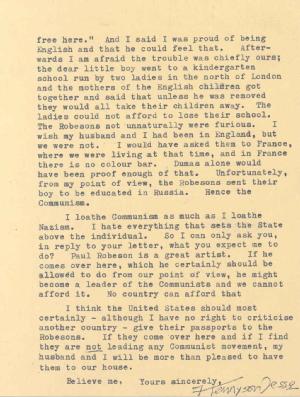Let Robeson Sing
In 1959, after a long struggle, the great actor, singer and human rights activist Paul Robeson played Othello at Stratford on Avon.
In 1950 Robeson's passport was withdrawn on the grounds that his right to travel was against American interests. Robeson would challenge this ban in the courts for eight years; meanwhile a campaign on his behalf was spearheaded in Britain by trades unions, artists and the Left.
With independence movements growing across the globe, MI5 were adamant that even if Robeson were allowed to travel he must be banned from the UK: "He is convinced that he has a mission to lead oppressed negroes and colonial peoples everywhere. He is a fanatical communist and intensely ambitious" [Internal memo, 13 July 1951; National Archives: KV/2/1829].
MI5 regarded the campaigners as Moscow's dupes or worse ["Plenty of thought has been given to the problem of getting suitable persons to wring tears from the Home Office on Robeson's behalf"] but support was intense and widespread.
In 1957, unable to accept countless invitations to perform abroad, Paul Robeson sang for audiences in London and Wales via the transatlantic telephone cable: "We have to learn the hard way that there is another way to sing".
Finally - in June 1958 - the Supreme Court ruled that it was unconstitutional to deny a US passport on political grounds. The following month Robeson flew to London [Passport no.1145187]. In an intense few months, he sang to millions on television and radio; he became the first lay person - and the first non-White - to take the pulpit in St Paul's Cathedral; he revisited the USSR; and he prepared 'Othello'.
During the spring term of 2009, the Modern Records Centre hosted an exhibition to commemorate the 50th anniversary of Paul Robeson's performance as Othello at the Shakespeare Memorial Theatre in Stratford on Avon. The exhibition included items from the collections of the Modern Records Centre, the Royal Shakespeare Company and the Shakespeare Birthplace Trust, and coincided with the first performances of a new RSC production of 'Othello' at the Warwick Arts Centre, University of Warwick. The documents below are taken from the Modern Records Centre collections and show how Paul Robeson's British supporters organised the 1957 long-distance concert in St Pancras Town Hall, and raised support for the campaign to give him the freedom to leave the United States.
Programme for Paul Robeson's recital tour of Britain in Spring 1949
It includes a short biographical outline of Robeson (with illustrations), information about the music that will be played, and details of the musicians touring with Robeson - the white South African Lionel Bowman and the black American Lawrence Brown.
[Included in the records of the Bristol Unity Players' Club; document reference: MSS.212/L/3/1]
Circular from the Provisional Committee to Restore Paul Robeson's Passport, 1954
Members of the Provisional Committee included the writer Dorothy Parker and US civil rights activist W.E.B. Du Bois. The circular comments on "the hysteria of these times" which is denying Robeson "the opportunity to find abroad the normal means of livelihood no longer open to him in his own country".
[Included in the records of the Trades Union Congress; document reference: MSS.292/973/5]
'A giant for freedom', 1955
Biographical note about Robeson. This was circulated by the London Co-operative Party with a press release expressing approval for the actions of 249 delegates to the 1955 Trades Union Congress, who had cabled President Eisenhower with a request to "intervene to secure the issuance of a passport to Paul Robeson, world renowned singer and artist", as "the British workers and people are anxious to again hear this great son of America".
[Included in the records of the Trades Union Congress; document reference: MSS.292/973/6]
'Paul Robeson goes to Washington', 1956
National Paul Robeson Committee pamphlet written by Mrs Eslanda Goode Robeson. Mrs Robeson criticises the proceedings of the Un-American Activities Committee, and talks about the evidence given to it by her husband Paul Robeson.
[Included in the papers of Clive Jenkins; document reference: MSS.79/6/CJ/3/110]
Decisions of the National Committee Meeting of the National Paul Robeson Committee, 10 February 1957
The minutes outline the policy and organisational proposals of the Committee in their campaign to allow Paul Robeson the right to travel outside the United States.
[Included in the papers of Clive Jenkins; document reference: MSS.79/6/CJ/3/110]
Copy of letter sent to the poet Hugh MacDiarmid by the National Paul Robeson Committee, 1957
It expresses concern at an article written by MacDiarmid in the 'Daily Worker', which associated the Committee with the Communist Party.
[Included in the papers of Clive Jenkins; document reference: MSS.79/6/CJ/3/110]
Copy of letter from the Embassy of the United States of America, London, 1957
It is a short response to the appeal to allow Robeson to travel, stating that "he has refused to comply with the requirements which every other United States citizens must meet to obtain a passport", and that the courts have ruled against him.
[Included in the papers of Clive Jenkins; document reference: MSS.79/6/CJ/3/110]
'Famous people say... Let Robeson Sing', 1957
Booklet publicising the Paul Robeson Conference and Concert to be held in St Pancras Town Hall, London, on 26 May 1957. It includes comments in support of the campaign from public figures including Trevor Huddleston, Augustus John, Benjamin Britten, Kingsley Amis and John Betjeman.
[Included in the papers of Clive Jenkins; document reference: MSS.79/6/CJ/3/110]
Description of the Robeson Conference, St Pancras Town Hall, 1957
It contains summaries of the speeches given by the Chairman and 16 delegates to the conference, including Marie Burke, who acted with Robeson in a London production of the musical 'Showboat', Mr Francis, a miner from South Wales, and Joseph Murumbi, of the Movement for Colonial Freedom.
[Included in the papers of Clive Jenkins; document reference: MSS.79/6/CJ/3/110]
Schedule for the Paul Robeson Concert at St Pancras Town Hall, 1957
It includes "Paul Robeson singing direct from New York (by special Trans-Atlantic hook-up)".
[Included in the papers of Clive Jenkins; document reference: MSS.79/6/CJ/3/110]
Letter from the GPO (General Post Office) giving information about the cost of the trans-Atlantic broadcast to the concert by Paul Robeson, 1957
The cost of the "15 minute 'amplified' telephone call from New York to St Pancras Town Hall" would be just over £300.
[Included in the papers of Clive Jenkins; document reference: MSS.79/6/CJ/3/110]
Circular from the London Paul Robeson Committee, undated (1957)
It targets the British Labour movement, and asks for their support for the campaign and for delegates to attend the Paul Robeson Conference.
[Included in the papers of Clive Jenkins; document reference: MSS.79/6/CJ/3/110]
'Paul Robeson Sings', undated (c.1957)
Advertisement for two new records sold by the National Paul Robeson Committee.
[Included in the papers of Clive Jenkins; document reference: MSS.79/6/CJ/3/110]
'An appeal to President Eisenhower, United States of America', undated (1957)
One of the signed petition sheets asking the US President "to intercede favourably on the question of Paul Robeson's application for a passport".
[Included in the papers of Clive Jenkins; document reference: MSS.79/6/CJ/3/110]
Circular on the campaign, sent by the Secretary of Coventry Borough Labour Party, 1957
It comments on the "hysterical McCarthyism" in the USA, and asks members to promote the petition as "in our opinion there should be freedom of movement to everyone whatever his colour, race or political creed".
[Included in the records of Coventry Borough Labour Party; document reference: MSS.11/3/12/423]
Extract from article in the 'Sunday Express' opposing the campaign, 1957
The author, John Gordon, argues that "Robeson put himself in the doghouse. Let him stay there".
[Included in the papers of Clive Jenkins; document reference: MSS.79/6/CJ/3/110 - various press cuttings on the campaign are included in this file]
Letter from F. Tennyson Jesse, recalling the visit of Paul and Essie Robeson to her home, 1957
It comments on the freedom Robeson initially felt in England, and the racism experienced by his son at a kindergarten in London.
[Included in the papers of Clive Jenkins; document reference: MSS.79/6/CJ/3/110]
Introductory text by Professor Tony Howard, captions by Liz Wood. First published on 29 January 2009.

